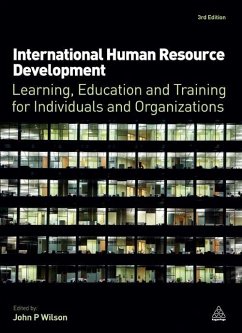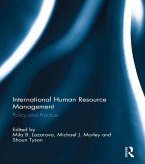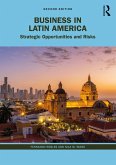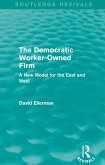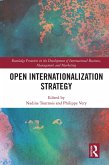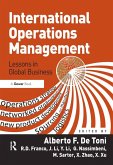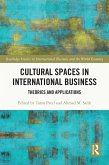John P Wilson
International Human Resource Development (eBook, ePUB)
Learning, Education and Training for Individuals and Organizations
38,95 €
38,95 €
inkl. MwSt.
Sofort per Download lieferbar

19 °P sammeln
38,95 €
Als Download kaufen

38,95 €
inkl. MwSt.
Sofort per Download lieferbar

19 °P sammeln
Jetzt verschenken
Alle Infos zum eBook verschenken
38,95 €
inkl. MwSt.
Sofort per Download lieferbar
Alle Infos zum eBook verschenken

19 °P sammeln
John P Wilson
International Human Resource Development (eBook, ePUB)
Learning, Education and Training for Individuals and Organizations
- Format: ePub
- Merkliste
- Auf die Merkliste
- Bewerten Bewerten
- Teilen
- Produkt teilen
- Produkterinnerung
- Produkterinnerung

Bitte loggen Sie sich zunächst in Ihr Kundenkonto ein oder registrieren Sie sich bei
bücher.de, um das eBook-Abo tolino select nutzen zu können.
Hier können Sie sich einloggen
Hier können Sie sich einloggen
Sie sind bereits eingeloggt. Klicken Sie auf 2. tolino select Abo, um fortzufahren.

Bitte loggen Sie sich zunächst in Ihr Kundenkonto ein oder registrieren Sie sich bei bücher.de, um das eBook-Abo tolino select nutzen zu können.
International Human Resource Development provides thought-provoking questions and stimulating answers to key issues in human resource development today, putting HRD in its strategic organizational context and examining in depth the process of learning from different perspectives.
This third edition provides a thorough exploration of international human resource development, and has been completely updated and revised with a variety of case studies and contributions from a range of HR development experts, making it the most topical book in this field. It also addresses the increasingly…mehr
- Geräte: eReader
- mit Kopierschutz
- eBook Hilfe
- Größe: 8.59MB
- FamilySharing(5)
Andere Kunden interessierten sich auch für
![International Human Resource Management (eBook, ePUB) International Human Resource Management (eBook, ePUB)]() International Human Resource Management (eBook, ePUB)30,95 €
International Human Resource Management (eBook, ePUB)30,95 €![Business in Latin America (eBook, ePUB) Business in Latin America (eBook, ePUB)]() Fernando RoblesBusiness in Latin America (eBook, ePUB)35,95 €
Fernando RoblesBusiness in Latin America (eBook, ePUB)35,95 €![Cross-Cultural Management (eBook, ePUB) Cross-Cultural Management (eBook, ePUB)]() Mai Nguyen-Phuong-MaiCross-Cultural Management (eBook, ePUB)50,95 €
Mai Nguyen-Phuong-MaiCross-Cultural Management (eBook, ePUB)50,95 €![The Democratic Worker-Owned Firm (Routledge Revivals) (eBook, ePUB) The Democratic Worker-Owned Firm (Routledge Revivals) (eBook, ePUB)]() David EllermanThe Democratic Worker-Owned Firm (Routledge Revivals) (eBook, ePUB)48,95 €
David EllermanThe Democratic Worker-Owned Firm (Routledge Revivals) (eBook, ePUB)48,95 €![Open Internationalization Strategy (eBook, ePUB) Open Internationalization Strategy (eBook, ePUB)]() Open Internationalization Strategy (eBook, ePUB)51,95 €
Open Internationalization Strategy (eBook, ePUB)51,95 €![International Operations Management (eBook, ePUB) International Operations Management (eBook, ePUB)]() Alberto F. De ToniInternational Operations Management (eBook, ePUB)39,95 €
Alberto F. De ToniInternational Operations Management (eBook, ePUB)39,95 €![Cultural Spaces in International Business (eBook, ePUB) Cultural Spaces in International Business (eBook, ePUB)]() Cultural Spaces in International Business (eBook, ePUB)44,95 €
Cultural Spaces in International Business (eBook, ePUB)44,95 €-
-
-
International Human Resource Development provides thought-provoking questions and stimulating answers to key issues in human resource development today, putting HRD in its strategic organizational context and examining in depth the process of learning from different perspectives.
This third edition provides a thorough exploration of international human resource development, and has been completely updated and revised with a variety of case studies and contributions from a range of HR development experts, making it the most topical book in this field. It also addresses the increasingly important area of knowledge management, incorporating learning and development.
Clearly structured and mapped against the current Chartered Institute of Personnel and Development (CIPD) standards, this comprehensive handbook covers each aspect of the training cycle, including the role and identification of learning, training and development needs in organizations, working in multicultural and multilingual settings, learning and competitive strategy, planning and design, delivering effective training programmes, assessment and evaluation, international development and managing the human resource function.
This third edition provides a thorough exploration of international human resource development, and has been completely updated and revised with a variety of case studies and contributions from a range of HR development experts, making it the most topical book in this field. It also addresses the increasingly important area of knowledge management, incorporating learning and development.
Clearly structured and mapped against the current Chartered Institute of Personnel and Development (CIPD) standards, this comprehensive handbook covers each aspect of the training cycle, including the role and identification of learning, training and development needs in organizations, working in multicultural and multilingual settings, learning and competitive strategy, planning and design, delivering effective training programmes, assessment and evaluation, international development and managing the human resource function.
Produktdetails
- Produktdetails
- Verlag: Kogan Page eBook
- Seitenzahl: 536
- Erscheinungstermin: 3. Oktober 2012
- Englisch
- ISBN-13: 9780749461072
- Artikelnr.: 38397214
- Verlag: Kogan Page eBook
- Seitenzahl: 536
- Erscheinungstermin: 3. Oktober 2012
- Englisch
- ISBN-13: 9780749461072
- Artikelnr.: 38397214
- Herstellerkennzeichnung Die Herstellerinformationen sind derzeit nicht verfügbar.
John P Wilson is a researcher and consultant with 40 years' experience in education and training, working with a range of international organizations. He currently teaches at the University of Oxford and the University of Sheffield. He is also Director of the EU Commission project Call Centre Training and Knowledge Transfer. He is the author of The Call Centre Training Handbook and Experiential Learning (both also published by Kogan Page).
List of figures
List of tables
List of in practice case studies
Contributors
Preface
Part One: International human resource development and learning
01 International human resource development
John P Wilson
Learning outcomes
Introduction
Defining education, training, development and learning
Human resource development
Human capital
Conclusion
Questions for reflection
Further information sources
References
02 Strategic human resource development
Thomas N Garacan and Ronan Carbery
Learning outcomes
Introduction
Defining strategic HRD
Understanding the contribution of SHRD to individual and business
performance
Theoretical models of SHRD
Facilitating and enabling conditions for SHRD in organizations
Conclusion
Further information sources
References
03 What is learning?
John P Wilson
Learning outcomes
Introduction
Defining learning
Behaviourism
Cognitivism
Social learning
Humanistic learning
Cognitive science and learning
Conclusion
Questions for reflection
Further information sources
References
Part Two: Organizational Learning
04 Change management and organizational development
John P Wilson
Learning outcomes
Introduction
Competition and the nature of change
Organization development
Strategies for change and organization development
Conclusion
Questions for reflection
Further information sources
References
05 Knowledge management
Eduardo Tomé
Learning outcomes
Introduction
Concepts
Historical perspective
The knowledge-management perspective on intangibles
Conclusion
Questions for reflection
Further information sources
References
Part Three: National and international learning, education, training and
human resource development
06 National systems of education
John P Wilson
Learning outcomes
Introduction
Education systems
A brief history of UK education
State intervention in early UK education
Education for all
Improving the US education system
Improving the UK's education system: the race to the top
The social benefits of education
Equality of educational opportunity
Conclusion
Questions for reflection
Further information sources
References
07 UK vocational education and training
John P Wilson
Learning outcomes
Introduction
A brief history of UK vocational education and training
The UK vocational education and training system
HRD roles
Conclusion
Questions for reflection
Further information sources
References
08 European vocational education and training
Martin Mulder
Learning outcomes
Introduction
VET in Europe - CVT - HRD - LLL: fading boundaries
European VET and national systems of education: wide diversity
Conclusion
Questions for reflection
Further information sources
References
09 National human resource development strategies: comparing Brazil,
Russia, India and China
Alexandre Ardichvili, Elena K Zavyalova and Vera N Minina
Learning outcomes
Introduction
National human resource development
NHRD in Brazil
NHRD in Russia
NHRD in India
NHRD in China
NHRD in BRICs: comparative analysis
Conclusion
Questions for reflection
Further information sources
References
10 International development: policy learning as an approach to VET reform
in transition and development countries
Sören Nielsen and Madlen Serban
Learning outcomes
Introduction
The mission and role of the European Training Foundation
From policy lending and borrowing towards policy learning
VET policy challenges for countries in transition
What can HRD policies learn from learning theories?
Policy learning: applying the changing learning paradigm for facilitation
of policy advice on VET reform in transition countries
Policy learning in action: Phase I 2007-08: examples from Kyrgyzstan,
Morocco and Turkey
Policy learning in action: Phase II 2010 onwards: The Torino Process and
evidence-informed policy development
Conclusion
Questions for reflection
Notes
Further information sources
References
11 Capacity development and human resource development
Dalia Al-Zendi and John P Wilson
Learning outcomes
Introduction
The evolution of capacity building and capacity development
Defining capacity building and capacity development
Capacity development for all nations
Development as freedom
The capacity development process
Capacity building/capacity development and human resource development
United Nations Development Programme
The United Nations' Human Development Index
Development for well-being
The challenges facing capacity development
Development and sustainability
Capacity development results framework
Conclusion
Questions for reflection
Further information sources
References
Part Four: The training cycle
Part Four A: Identification of learning needs
12 The identification of learning needs
Richard Palmer, Allan Claudius Queiroz Barbosa, Leandro Pinheiro Cintra,
Júnia Marçal Rodrigues and Juliana Barbosa e Oliveira
Learning outcomes
Introduction
Undertaking a learning needs analysis
Needs at the organizational level
Needs at the departmental level
Needs at occupational levels
Needs at the individual level
Defining the training priorities
Conclusion
Questions for reflection
Further information sources
References
Part Four B: Design
13 Designing learning events
David Simmonds
Learning outcomes
Introduction
Objectives
Learners
Content
Location
Time
Methods
Resources
Conclusion
Questions for reflection
References
14 Working in multicultural and multilingual environments: HRD
professionals as learning and change agents in the global workplace
Maria Cseh and Beatriz Coningham
Learning outcomes
Introduction
What is a global workplace?
What is the role of HRD professionals in the global workplace?
How should the role of HRD professionals be enacted in the global
workplace?
What are the HRD approaches to learning and change in the global workplace?
Conclusion
Questions for reflection
Further information sources
References
Part Four C: Delivery
15 Delivering training
John Kirkham and Jacqueline Pattison
Learning outcomes
Introduction
Where to begin
Setting the learning environment
Working with learning objectives and session plans
Learning activities
Delivery styles
Feedback
Coaching during the workshop
Team building in the classroom
Motivation to learn
Principles of self-development
'Joint learning' for management, staff and staff representatives
Legislation and the learning environment
Dealing with difficult scenarios Conclusion
Questions for reflection
Further information sources
References
16 Informal, non-formal and work-based methods of learning
Jacqueline Pattison, John Kirkham and Mariana Gabriela Hudrea
Learning outcomes
Introduction
Is investment in formal learning worthwhile?
Formal, informal and non-formal learning
Lifelong learning and lifewide learning
A-Z of learning, training and development methods
Conclusion
Questions for reflection
Further information sources
References
17 Coaching and mentoring
Stephanie T Sturges
Learning outcomes
Introduction
Coaching and mentoring
Types of coaching and mentoring
Qualities and skills of coaching and mentoring
Models of coaching
Developmental or transformational coaching and mentoring
Conclusion
Questions for reflection
Further information sources
References
Part Four D: Evaluation
18 Assessment and evaluation
Tanuja Agarwala
Learning outcomes
Introduction
Definition
Significance
Objectives
Evaluation approaches
Choosing criterion measures
Kirkpatrick's model of training evaluation (1959)
Training evaluation: monetary benefits
Experimental designs
E-training evaluation
Conclusion
Questions for reflection
References
Part Five: Managing HRD
19 Leadership and management development
Ronan Carbery and Thomas N Garavan
Learning outcomes
Introduction
Management and leadership development: the same or different?
The context of management and leadership development
Management and leadership competency models
Selecting management and leadership development strategies
Evaluating management and leadership development
Conclusion
Questions for reflection
Further information sources
References
20 Managing human resource development functions and services
Barney Erasmus and Pieter Loedolff
Learning outcomes
Introduction and learning objectives
The importance of HRD
The place and role of the HRD function in the structure of the organization
Managing the HRD function
Coordinating HRD functions and services in the organization
Training and development budgets and cost analysis
Conclusion
Questions for reflection
References
21 HRD practice and research: investigating business issues through applied
social science research
K Peter Kuchinke
Learning outcomes
Introduction
Social science research, management and human resource development
Approaches to applied research
Applied research, values and interests
Conclusion: linking research to organization change, innovation and
learning
Questions for reflection
References
22 HRD and consultancy
Kiran Trehan and Clare Rigg
Learning outcomes
Introduction
HRD as consultancy
Consultancy models
Consulting techniques
Problems and pitfalls in HRD consultancy
Conclusion
Questions for reflection
References
23 Learning spaces that change people and organizations
Colin Beard and Ilfryn Price
Learning outcomes
Introduction
Schools, colleges, universities and workspaces
So what do we know about learning?
A simple model of complexity
Mirror image? Learning environments reflect learning theory complexity
Learning and working: a convergent evolution
Thinking spaces for learning, and working
Innovation at work: spatial dynamics and conversations for innovation and
learning
Conclusion
Questions for reflection
Further information sources
References
24 HRD and business ethics
Alexandre Ardichvili and Douglas Jondle
Learning outcomes
Introduction
The increasing role of ethics training
Ethical business cultures and organization change
HRD activities in support of ethical business cultures
Conclusion
References
Index
List of tables
List of in practice case studies
Contributors
Preface
Part One: International human resource development and learning
01 International human resource development
John P Wilson
Learning outcomes
Introduction
Defining education, training, development and learning
Human resource development
Human capital
Conclusion
Questions for reflection
Further information sources
References
02 Strategic human resource development
Thomas N Garacan and Ronan Carbery
Learning outcomes
Introduction
Defining strategic HRD
Understanding the contribution of SHRD to individual and business
performance
Theoretical models of SHRD
Facilitating and enabling conditions for SHRD in organizations
Conclusion
Further information sources
References
03 What is learning?
John P Wilson
Learning outcomes
Introduction
Defining learning
Behaviourism
Cognitivism
Social learning
Humanistic learning
Cognitive science and learning
Conclusion
Questions for reflection
Further information sources
References
Part Two: Organizational Learning
04 Change management and organizational development
John P Wilson
Learning outcomes
Introduction
Competition and the nature of change
Organization development
Strategies for change and organization development
Conclusion
Questions for reflection
Further information sources
References
05 Knowledge management
Eduardo Tomé
Learning outcomes
Introduction
Concepts
Historical perspective
The knowledge-management perspective on intangibles
Conclusion
Questions for reflection
Further information sources
References
Part Three: National and international learning, education, training and
human resource development
06 National systems of education
John P Wilson
Learning outcomes
Introduction
Education systems
A brief history of UK education
State intervention in early UK education
Education for all
Improving the US education system
Improving the UK's education system: the race to the top
The social benefits of education
Equality of educational opportunity
Conclusion
Questions for reflection
Further information sources
References
07 UK vocational education and training
John P Wilson
Learning outcomes
Introduction
A brief history of UK vocational education and training
The UK vocational education and training system
HRD roles
Conclusion
Questions for reflection
Further information sources
References
08 European vocational education and training
Martin Mulder
Learning outcomes
Introduction
VET in Europe - CVT - HRD - LLL: fading boundaries
European VET and national systems of education: wide diversity
Conclusion
Questions for reflection
Further information sources
References
09 National human resource development strategies: comparing Brazil,
Russia, India and China
Alexandre Ardichvili, Elena K Zavyalova and Vera N Minina
Learning outcomes
Introduction
National human resource development
NHRD in Brazil
NHRD in Russia
NHRD in India
NHRD in China
NHRD in BRICs: comparative analysis
Conclusion
Questions for reflection
Further information sources
References
10 International development: policy learning as an approach to VET reform
in transition and development countries
Sören Nielsen and Madlen Serban
Learning outcomes
Introduction
The mission and role of the European Training Foundation
From policy lending and borrowing towards policy learning
VET policy challenges for countries in transition
What can HRD policies learn from learning theories?
Policy learning: applying the changing learning paradigm for facilitation
of policy advice on VET reform in transition countries
Policy learning in action: Phase I 2007-08: examples from Kyrgyzstan,
Morocco and Turkey
Policy learning in action: Phase II 2010 onwards: The Torino Process and
evidence-informed policy development
Conclusion
Questions for reflection
Notes
Further information sources
References
11 Capacity development and human resource development
Dalia Al-Zendi and John P Wilson
Learning outcomes
Introduction
The evolution of capacity building and capacity development
Defining capacity building and capacity development
Capacity development for all nations
Development as freedom
The capacity development process
Capacity building/capacity development and human resource development
United Nations Development Programme
The United Nations' Human Development Index
Development for well-being
The challenges facing capacity development
Development and sustainability
Capacity development results framework
Conclusion
Questions for reflection
Further information sources
References
Part Four: The training cycle
Part Four A: Identification of learning needs
12 The identification of learning needs
Richard Palmer, Allan Claudius Queiroz Barbosa, Leandro Pinheiro Cintra,
Júnia Marçal Rodrigues and Juliana Barbosa e Oliveira
Learning outcomes
Introduction
Undertaking a learning needs analysis
Needs at the organizational level
Needs at the departmental level
Needs at occupational levels
Needs at the individual level
Defining the training priorities
Conclusion
Questions for reflection
Further information sources
References
Part Four B: Design
13 Designing learning events
David Simmonds
Learning outcomes
Introduction
Objectives
Learners
Content
Location
Time
Methods
Resources
Conclusion
Questions for reflection
References
14 Working in multicultural and multilingual environments: HRD
professionals as learning and change agents in the global workplace
Maria Cseh and Beatriz Coningham
Learning outcomes
Introduction
What is a global workplace?
What is the role of HRD professionals in the global workplace?
How should the role of HRD professionals be enacted in the global
workplace?
What are the HRD approaches to learning and change in the global workplace?
Conclusion
Questions for reflection
Further information sources
References
Part Four C: Delivery
15 Delivering training
John Kirkham and Jacqueline Pattison
Learning outcomes
Introduction
Where to begin
Setting the learning environment
Working with learning objectives and session plans
Learning activities
Delivery styles
Feedback
Coaching during the workshop
Team building in the classroom
Motivation to learn
Principles of self-development
'Joint learning' for management, staff and staff representatives
Legislation and the learning environment
Dealing with difficult scenarios Conclusion
Questions for reflection
Further information sources
References
16 Informal, non-formal and work-based methods of learning
Jacqueline Pattison, John Kirkham and Mariana Gabriela Hudrea
Learning outcomes
Introduction
Is investment in formal learning worthwhile?
Formal, informal and non-formal learning
Lifelong learning and lifewide learning
A-Z of learning, training and development methods
Conclusion
Questions for reflection
Further information sources
References
17 Coaching and mentoring
Stephanie T Sturges
Learning outcomes
Introduction
Coaching and mentoring
Types of coaching and mentoring
Qualities and skills of coaching and mentoring
Models of coaching
Developmental or transformational coaching and mentoring
Conclusion
Questions for reflection
Further information sources
References
Part Four D: Evaluation
18 Assessment and evaluation
Tanuja Agarwala
Learning outcomes
Introduction
Definition
Significance
Objectives
Evaluation approaches
Choosing criterion measures
Kirkpatrick's model of training evaluation (1959)
Training evaluation: monetary benefits
Experimental designs
E-training evaluation
Conclusion
Questions for reflection
References
Part Five: Managing HRD
19 Leadership and management development
Ronan Carbery and Thomas N Garavan
Learning outcomes
Introduction
Management and leadership development: the same or different?
The context of management and leadership development
Management and leadership competency models
Selecting management and leadership development strategies
Evaluating management and leadership development
Conclusion
Questions for reflection
Further information sources
References
20 Managing human resource development functions and services
Barney Erasmus and Pieter Loedolff
Learning outcomes
Introduction and learning objectives
The importance of HRD
The place and role of the HRD function in the structure of the organization
Managing the HRD function
Coordinating HRD functions and services in the organization
Training and development budgets and cost analysis
Conclusion
Questions for reflection
References
21 HRD practice and research: investigating business issues through applied
social science research
K Peter Kuchinke
Learning outcomes
Introduction
Social science research, management and human resource development
Approaches to applied research
Applied research, values and interests
Conclusion: linking research to organization change, innovation and
learning
Questions for reflection
References
22 HRD and consultancy
Kiran Trehan and Clare Rigg
Learning outcomes
Introduction
HRD as consultancy
Consultancy models
Consulting techniques
Problems and pitfalls in HRD consultancy
Conclusion
Questions for reflection
References
23 Learning spaces that change people and organizations
Colin Beard and Ilfryn Price
Learning outcomes
Introduction
Schools, colleges, universities and workspaces
So what do we know about learning?
A simple model of complexity
Mirror image? Learning environments reflect learning theory complexity
Learning and working: a convergent evolution
Thinking spaces for learning, and working
Innovation at work: spatial dynamics and conversations for innovation and
learning
Conclusion
Questions for reflection
Further information sources
References
24 HRD and business ethics
Alexandre Ardichvili and Douglas Jondle
Learning outcomes
Introduction
The increasing role of ethics training
Ethical business cultures and organization change
HRD activities in support of ethical business cultures
Conclusion
References
Index
List of figures
List of tables
List of in practice case studies
Contributors
Preface
Part One: International human resource development and learning
01 International human resource development
John P Wilson
Learning outcomes
Introduction
Defining education, training, development and learning
Human resource development
Human capital
Conclusion
Questions for reflection
Further information sources
References
02 Strategic human resource development
Thomas N Garacan and Ronan Carbery
Learning outcomes
Introduction
Defining strategic HRD
Understanding the contribution of SHRD to individual and business
performance
Theoretical models of SHRD
Facilitating and enabling conditions for SHRD in organizations
Conclusion
Further information sources
References
03 What is learning?
John P Wilson
Learning outcomes
Introduction
Defining learning
Behaviourism
Cognitivism
Social learning
Humanistic learning
Cognitive science and learning
Conclusion
Questions for reflection
Further information sources
References
Part Two: Organizational Learning
04 Change management and organizational development
John P Wilson
Learning outcomes
Introduction
Competition and the nature of change
Organization development
Strategies for change and organization development
Conclusion
Questions for reflection
Further information sources
References
05 Knowledge management
Eduardo Tomé
Learning outcomes
Introduction
Concepts
Historical perspective
The knowledge-management perspective on intangibles
Conclusion
Questions for reflection
Further information sources
References
Part Three: National and international learning, education, training and
human resource development
06 National systems of education
John P Wilson
Learning outcomes
Introduction
Education systems
A brief history of UK education
State intervention in early UK education
Education for all
Improving the US education system
Improving the UK's education system: the race to the top
The social benefits of education
Equality of educational opportunity
Conclusion
Questions for reflection
Further information sources
References
07 UK vocational education and training
John P Wilson
Learning outcomes
Introduction
A brief history of UK vocational education and training
The UK vocational education and training system
HRD roles
Conclusion
Questions for reflection
Further information sources
References
08 European vocational education and training
Martin Mulder
Learning outcomes
Introduction
VET in Europe - CVT - HRD - LLL: fading boundaries
European VET and national systems of education: wide diversity
Conclusion
Questions for reflection
Further information sources
References
09 National human resource development strategies: comparing Brazil,
Russia, India and China
Alexandre Ardichvili, Elena K Zavyalova and Vera N Minina
Learning outcomes
Introduction
National human resource development
NHRD in Brazil
NHRD in Russia
NHRD in India
NHRD in China
NHRD in BRICs: comparative analysis
Conclusion
Questions for reflection
Further information sources
References
10 International development: policy learning as an approach to VET reform
in transition and development countries
Sören Nielsen and Madlen Serban
Learning outcomes
Introduction
The mission and role of the European Training Foundation
From policy lending and borrowing towards policy learning
VET policy challenges for countries in transition
What can HRD policies learn from learning theories?
Policy learning: applying the changing learning paradigm for facilitation
of policy advice on VET reform in transition countries
Policy learning in action: Phase I 2007-08: examples from Kyrgyzstan,
Morocco and Turkey
Policy learning in action: Phase II 2010 onwards: The Torino Process and
evidence-informed policy development
Conclusion
Questions for reflection
Notes
Further information sources
References
11 Capacity development and human resource development
Dalia Al-Zendi and John P Wilson
Learning outcomes
Introduction
The evolution of capacity building and capacity development
Defining capacity building and capacity development
Capacity development for all nations
Development as freedom
The capacity development process
Capacity building/capacity development and human resource development
United Nations Development Programme
The United Nations' Human Development Index
Development for well-being
The challenges facing capacity development
Development and sustainability
Capacity development results framework
Conclusion
Questions for reflection
Further information sources
References
Part Four: The training cycle
Part Four A: Identification of learning needs
12 The identification of learning needs
Richard Palmer, Allan Claudius Queiroz Barbosa, Leandro Pinheiro Cintra,
Júnia Marçal Rodrigues and Juliana Barbosa e Oliveira
Learning outcomes
Introduction
Undertaking a learning needs analysis
Needs at the organizational level
Needs at the departmental level
Needs at occupational levels
Needs at the individual level
Defining the training priorities
Conclusion
Questions for reflection
Further information sources
References
Part Four B: Design
13 Designing learning events
David Simmonds
Learning outcomes
Introduction
Objectives
Learners
Content
Location
Time
Methods
Resources
Conclusion
Questions for reflection
References
14 Working in multicultural and multilingual environments: HRD
professionals as learning and change agents in the global workplace
Maria Cseh and Beatriz Coningham
Learning outcomes
Introduction
What is a global workplace?
What is the role of HRD professionals in the global workplace?
How should the role of HRD professionals be enacted in the global
workplace?
What are the HRD approaches to learning and change in the global workplace?
Conclusion
Questions for reflection
Further information sources
References
Part Four C: Delivery
15 Delivering training
John Kirkham and Jacqueline Pattison
Learning outcomes
Introduction
Where to begin
Setting the learning environment
Working with learning objectives and session plans
Learning activities
Delivery styles
Feedback
Coaching during the workshop
Team building in the classroom
Motivation to learn
Principles of self-development
'Joint learning' for management, staff and staff representatives
Legislation and the learning environment
Dealing with difficult scenarios Conclusion
Questions for reflection
Further information sources
References
16 Informal, non-formal and work-based methods of learning
Jacqueline Pattison, John Kirkham and Mariana Gabriela Hudrea
Learning outcomes
Introduction
Is investment in formal learning worthwhile?
Formal, informal and non-formal learning
Lifelong learning and lifewide learning
A-Z of learning, training and development methods
Conclusion
Questions for reflection
Further information sources
References
17 Coaching and mentoring
Stephanie T Sturges
Learning outcomes
Introduction
Coaching and mentoring
Types of coaching and mentoring
Qualities and skills of coaching and mentoring
Models of coaching
Developmental or transformational coaching and mentoring
Conclusion
Questions for reflection
Further information sources
References
Part Four D: Evaluation
18 Assessment and evaluation
Tanuja Agarwala
Learning outcomes
Introduction
Definition
Significance
Objectives
Evaluation approaches
Choosing criterion measures
Kirkpatrick's model of training evaluation (1959)
Training evaluation: monetary benefits
Experimental designs
E-training evaluation
Conclusion
Questions for reflection
References
Part Five: Managing HRD
19 Leadership and management development
Ronan Carbery and Thomas N Garavan
Learning outcomes
Introduction
Management and leadership development: the same or different?
The context of management and leadership development
Management and leadership competency models
Selecting management and leadership development strategies
Evaluating management and leadership development
Conclusion
Questions for reflection
Further information sources
References
20 Managing human resource development functions and services
Barney Erasmus and Pieter Loedolff
Learning outcomes
Introduction and learning objectives
The importance of HRD
The place and role of the HRD function in the structure of the organization
Managing the HRD function
Coordinating HRD functions and services in the organization
Training and development budgets and cost analysis
Conclusion
Questions for reflection
References
21 HRD practice and research: investigating business issues through applied
social science research
K Peter Kuchinke
Learning outcomes
Introduction
Social science research, management and human resource development
Approaches to applied research
Applied research, values and interests
Conclusion: linking research to organization change, innovation and
learning
Questions for reflection
References
22 HRD and consultancy
Kiran Trehan and Clare Rigg
Learning outcomes
Introduction
HRD as consultancy
Consultancy models
Consulting techniques
Problems and pitfalls in HRD consultancy
Conclusion
Questions for reflection
References
23 Learning spaces that change people and organizations
Colin Beard and Ilfryn Price
Learning outcomes
Introduction
Schools, colleges, universities and workspaces
So what do we know about learning?
A simple model of complexity
Mirror image? Learning environments reflect learning theory complexity
Learning and working: a convergent evolution
Thinking spaces for learning, and working
Innovation at work: spatial dynamics and conversations for innovation and
learning
Conclusion
Questions for reflection
Further information sources
References
24 HRD and business ethics
Alexandre Ardichvili and Douglas Jondle
Learning outcomes
Introduction
The increasing role of ethics training
Ethical business cultures and organization change
HRD activities in support of ethical business cultures
Conclusion
References
Index
List of tables
List of in practice case studies
Contributors
Preface
Part One: International human resource development and learning
01 International human resource development
John P Wilson
Learning outcomes
Introduction
Defining education, training, development and learning
Human resource development
Human capital
Conclusion
Questions for reflection
Further information sources
References
02 Strategic human resource development
Thomas N Garacan and Ronan Carbery
Learning outcomes
Introduction
Defining strategic HRD
Understanding the contribution of SHRD to individual and business
performance
Theoretical models of SHRD
Facilitating and enabling conditions for SHRD in organizations
Conclusion
Further information sources
References
03 What is learning?
John P Wilson
Learning outcomes
Introduction
Defining learning
Behaviourism
Cognitivism
Social learning
Humanistic learning
Cognitive science and learning
Conclusion
Questions for reflection
Further information sources
References
Part Two: Organizational Learning
04 Change management and organizational development
John P Wilson
Learning outcomes
Introduction
Competition and the nature of change
Organization development
Strategies for change and organization development
Conclusion
Questions for reflection
Further information sources
References
05 Knowledge management
Eduardo Tomé
Learning outcomes
Introduction
Concepts
Historical perspective
The knowledge-management perspective on intangibles
Conclusion
Questions for reflection
Further information sources
References
Part Three: National and international learning, education, training and
human resource development
06 National systems of education
John P Wilson
Learning outcomes
Introduction
Education systems
A brief history of UK education
State intervention in early UK education
Education for all
Improving the US education system
Improving the UK's education system: the race to the top
The social benefits of education
Equality of educational opportunity
Conclusion
Questions for reflection
Further information sources
References
07 UK vocational education and training
John P Wilson
Learning outcomes
Introduction
A brief history of UK vocational education and training
The UK vocational education and training system
HRD roles
Conclusion
Questions for reflection
Further information sources
References
08 European vocational education and training
Martin Mulder
Learning outcomes
Introduction
VET in Europe - CVT - HRD - LLL: fading boundaries
European VET and national systems of education: wide diversity
Conclusion
Questions for reflection
Further information sources
References
09 National human resource development strategies: comparing Brazil,
Russia, India and China
Alexandre Ardichvili, Elena K Zavyalova and Vera N Minina
Learning outcomes
Introduction
National human resource development
NHRD in Brazil
NHRD in Russia
NHRD in India
NHRD in China
NHRD in BRICs: comparative analysis
Conclusion
Questions for reflection
Further information sources
References
10 International development: policy learning as an approach to VET reform
in transition and development countries
Sören Nielsen and Madlen Serban
Learning outcomes
Introduction
The mission and role of the European Training Foundation
From policy lending and borrowing towards policy learning
VET policy challenges for countries in transition
What can HRD policies learn from learning theories?
Policy learning: applying the changing learning paradigm for facilitation
of policy advice on VET reform in transition countries
Policy learning in action: Phase I 2007-08: examples from Kyrgyzstan,
Morocco and Turkey
Policy learning in action: Phase II 2010 onwards: The Torino Process and
evidence-informed policy development
Conclusion
Questions for reflection
Notes
Further information sources
References
11 Capacity development and human resource development
Dalia Al-Zendi and John P Wilson
Learning outcomes
Introduction
The evolution of capacity building and capacity development
Defining capacity building and capacity development
Capacity development for all nations
Development as freedom
The capacity development process
Capacity building/capacity development and human resource development
United Nations Development Programme
The United Nations' Human Development Index
Development for well-being
The challenges facing capacity development
Development and sustainability
Capacity development results framework
Conclusion
Questions for reflection
Further information sources
References
Part Four: The training cycle
Part Four A: Identification of learning needs
12 The identification of learning needs
Richard Palmer, Allan Claudius Queiroz Barbosa, Leandro Pinheiro Cintra,
Júnia Marçal Rodrigues and Juliana Barbosa e Oliveira
Learning outcomes
Introduction
Undertaking a learning needs analysis
Needs at the organizational level
Needs at the departmental level
Needs at occupational levels
Needs at the individual level
Defining the training priorities
Conclusion
Questions for reflection
Further information sources
References
Part Four B: Design
13 Designing learning events
David Simmonds
Learning outcomes
Introduction
Objectives
Learners
Content
Location
Time
Methods
Resources
Conclusion
Questions for reflection
References
14 Working in multicultural and multilingual environments: HRD
professionals as learning and change agents in the global workplace
Maria Cseh and Beatriz Coningham
Learning outcomes
Introduction
What is a global workplace?
What is the role of HRD professionals in the global workplace?
How should the role of HRD professionals be enacted in the global
workplace?
What are the HRD approaches to learning and change in the global workplace?
Conclusion
Questions for reflection
Further information sources
References
Part Four C: Delivery
15 Delivering training
John Kirkham and Jacqueline Pattison
Learning outcomes
Introduction
Where to begin
Setting the learning environment
Working with learning objectives and session plans
Learning activities
Delivery styles
Feedback
Coaching during the workshop
Team building in the classroom
Motivation to learn
Principles of self-development
'Joint learning' for management, staff and staff representatives
Legislation and the learning environment
Dealing with difficult scenarios Conclusion
Questions for reflection
Further information sources
References
16 Informal, non-formal and work-based methods of learning
Jacqueline Pattison, John Kirkham and Mariana Gabriela Hudrea
Learning outcomes
Introduction
Is investment in formal learning worthwhile?
Formal, informal and non-formal learning
Lifelong learning and lifewide learning
A-Z of learning, training and development methods
Conclusion
Questions for reflection
Further information sources
References
17 Coaching and mentoring
Stephanie T Sturges
Learning outcomes
Introduction
Coaching and mentoring
Types of coaching and mentoring
Qualities and skills of coaching and mentoring
Models of coaching
Developmental or transformational coaching and mentoring
Conclusion
Questions for reflection
Further information sources
References
Part Four D: Evaluation
18 Assessment and evaluation
Tanuja Agarwala
Learning outcomes
Introduction
Definition
Significance
Objectives
Evaluation approaches
Choosing criterion measures
Kirkpatrick's model of training evaluation (1959)
Training evaluation: monetary benefits
Experimental designs
E-training evaluation
Conclusion
Questions for reflection
References
Part Five: Managing HRD
19 Leadership and management development
Ronan Carbery and Thomas N Garavan
Learning outcomes
Introduction
Management and leadership development: the same or different?
The context of management and leadership development
Management and leadership competency models
Selecting management and leadership development strategies
Evaluating management and leadership development
Conclusion
Questions for reflection
Further information sources
References
20 Managing human resource development functions and services
Barney Erasmus and Pieter Loedolff
Learning outcomes
Introduction and learning objectives
The importance of HRD
The place and role of the HRD function in the structure of the organization
Managing the HRD function
Coordinating HRD functions and services in the organization
Training and development budgets and cost analysis
Conclusion
Questions for reflection
References
21 HRD practice and research: investigating business issues through applied
social science research
K Peter Kuchinke
Learning outcomes
Introduction
Social science research, management and human resource development
Approaches to applied research
Applied research, values and interests
Conclusion: linking research to organization change, innovation and
learning
Questions for reflection
References
22 HRD and consultancy
Kiran Trehan and Clare Rigg
Learning outcomes
Introduction
HRD as consultancy
Consultancy models
Consulting techniques
Problems and pitfalls in HRD consultancy
Conclusion
Questions for reflection
References
23 Learning spaces that change people and organizations
Colin Beard and Ilfryn Price
Learning outcomes
Introduction
Schools, colleges, universities and workspaces
So what do we know about learning?
A simple model of complexity
Mirror image? Learning environments reflect learning theory complexity
Learning and working: a convergent evolution
Thinking spaces for learning, and working
Innovation at work: spatial dynamics and conversations for innovation and
learning
Conclusion
Questions for reflection
Further information sources
References
24 HRD and business ethics
Alexandre Ardichvili and Douglas Jondle
Learning outcomes
Introduction
The increasing role of ethics training
Ethical business cultures and organization change
HRD activities in support of ethical business cultures
Conclusion
References
Index
